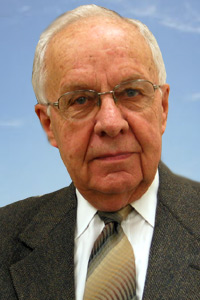Appreciating Our Professors: Thomas O’Toole
It was over in the twinkling of an eye. The entire event took, at most, ten seconds, but in that incredibly brief time I learned that the study of law was the right thing for me. The time was mid-September, 1963. The place was the old Georgetown University Law Center at 5th and E Streets, N.W. The room was shaped like a bowling alley. One hundred and twenty-five part-time evening students were shoehorned into that room. At precisely 5:45 P.M., Professor Thomas O’Toole entered the room from the back. It was the only way in and out of the room in which Constitutional law was being taught. Professor O’Toole took one step, paused, and from the back of the room, spoke in a loud, clear voice, “Mr. Chase, why was the Court in Euclid concerned about the scope of the town’s zoning plan?” Before Mr. Chase could answer, the Professor took another step into the room, paused, and said, “Mr. Kossow, why did I ask that question ?”
A few seconds later, after I had choked on an answer that included the words “comprehensive plan,” the Professor walked to the front of the class and said, “Mr. Hubbard, do you agree with Mr. Kossow’s answer?”
Forty-five years later, I remember verbatim the incident. Professor O’Toole, in ten seconds, changed the direction of my life.

